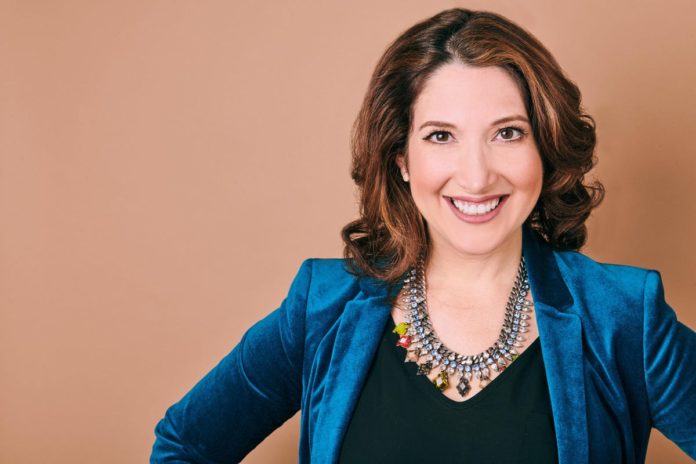*This is the first in a monthly series featuring women leading innovation and inclusivity in crypto, Web3, NFTs and the metaverse*
Randi Zuckerberg has always been at the forefront of innovative technology. As an early adopter of Web2 and the creator of Facebook Live, she is now one of the most prominent voices in Web3, especially when it comes to getting more women comfortable with crypto.
She recently launched HUG, a platform for Web3 creators, and groupHUG, an accelerator aimed at fostering the growth of women-led crypto businesses. Zuckerberg currently advises and works with more than a dozen crypto, NFT and metaverse related companies.
Additionally, last month she announced a new SiriusXM podcast, “Crypto Café With Randi Zuckerberg,” where she talks to metaverse experts and creators about how they’re helping make crypto less overwhelming and more accessible.
Randi Zuckerberg
Amy Shoenthal: Let’s start at the beginning. What first got you into the world of NFTs?
Randi Zuckerberg: For the last 20 years of my career, I felt like I had a split identity. There was ‘techie Randi’ and ‘artist Randi.’ I was working at Facebook and on the front lines of Web2 for a decade. Then I blew up my entire life to go sing on Broadway. Everyone thought I was a lunatic.
I was constantly juggling these two sides of myself, always going in and out of both worlds.
When NFTs crossed my plate about a year ago, it was the first time those two worlds came together in a way that made sense. I finally didn’t have to choose between being a techie or an artist. Those same people who thought I was a lunatic started calling me for advice on how to evaluate NFT projects. They needed help with both the technical expertise and the ability to to evaluate an artistic deal.
It was only last summer when I first started getting into the space, but I didn’t purchase my first NFT until months later. I am a real proponent of people starting off slowly. I really appreciated having several months to learn before I went all in.
After that learning period, I still felt like the space was quite intimidating, which is why I started making quick videos to help educate newcomers. I wanted to introduce people to NFTs in a way that felt friendly and welcoming.
Shoenthal: Talk to me about why it’s so intimidating. Why do you think so many are hesitant to move into this space?
Zuckerberg: It is very intimidating! I mean, it has its own language and vocabulary. I think it’s purposefully intimidating as a way to keep out newcomers. Plus, it’s very male-dominated so if you’re going into these kinds of alpha spaces you really feel that bro culture.
It’s also a sketchy neighborhood out there. There are a lot of scams, there’s lots of issues with safety and hacking and it’s not for the faint of heart. Unfortunately what I see is a lot of people who get into the space, they make really fast, impulsive, emotional buying decisions, and then they get hacked.
Another barrier is that the user experience is just not where it needs to be for mass adoption. There are a lot of wonderful things about decentralization, but that’s one of the major downsides for sure. The intimidation coupled with the lack of user friendliness – those are all sound reasons to be hesitant.
Shoenthal: I know you and others are working on making crypto and NFTs more inclusive but is anyone working on this user interface or user experience issue?
Zuckerberg: Yes, there are a few entrepreneurs I know of who are working on an alternative to Discord. Discord was primarily for gamers, but for some reason, that’s the platform where all crypto activity is happening and it’s not at all user friendly. In fact, it rewards people for being the quickest to respond, rather than being thoughtful or adding value.
There are also so many amazing, user-friendly communities like Curious Addys who do an excellent job trying to onboard people in a way that opens their eyes to the risks and security flaws of the space.
I’m never going to pressure anyone to buy into the space. I’m never going to tell anyone that they should invest or anything like that. But I do want women to understand the space because these are trends that are not going away. This is going to shape all of our careers over the coming years.
Shoenthal: Speaking of trends, can you talk about the crypto crash that happened over the past month and how that may have impacted efforts to encourage more people to get involved? What did we learn, if anything?
Zuckerberg: I’m smiling because I remember being a newcomer in Web2 and panicking when the market crashed. People who had been around for a while, the old guard, said, ‘we’ve seen these dips a million times.’ Now I’m the old guard that’s telling the young kids not to panic.
I have lost and gained so much phantom wealth on paper over the past 20 years. But it can be very scary. My heart goes out to people who lost money during this. I always tell people, please don’t put more than 1- 2% of your net worth in crypto. Please don’t invest more than you can afford to lose.
But there are some great things about dips, too. I do think the NFT market was oversaturated. There were too many projects coming out that were not differentiated and had no long term vision. A bear market elevates real builders in the space, not just people who are casually in it to make a quick buck.
My company, HUG, runs an incubator called GroupHUG, and the applications coming in now are blowing me away. We just opened our third cohort. The first two impressed me, but the third is really amazing because I can see how long term they’re thinking.
Shoenthal: The “women in crypto” movement has been criticized for being the next #girlboss movement, essentially accusing it of using feminism as a marketing ploy. One of the other criticisms has been that the only women leading the way in crypto already come from some wealth. Do you have any reaction to that?
Zuckerberg: Well, do people want advice from people who are not successful? If people are too successful to give advice, then who do you want advice from?
On the other hand, I will say that in the HUG community, I really try to take a backseat and not be the most vocal person in the conversations. Due to a multitude of luck and success, I acknowledge that I come to this space with more resources and that gives me a very different viewpoint than others. But when you spend time in the HUG community you hear from tons of people with different voices, varying socioeconomic status and viewpoints. It’s important to have multiple voices recognized in the room, not just the people who can afford to play. The space is open to everyone. That’s the entire point.
Shoenthal: Can you talk about how you and some of your peers in the space are purposely making the space more inclusive?
Zuckerberg: A lot of women-led projects have pioneered the free airdrop model. BFF gave a free NFT that, at one point, was worth one ethereum (the equivalent of one ethereum was once worth more than $3,000. Today, it’s closer to $1,700.) That was just dropped into people’s wallets. At HUG we give out half our NFTs completely for free because we want to make sure cost is not a barrier to entering our community. Meta Angels has a really innovative smart contract where you can loan an NFT to someone else to be part of their community. So I think a lot of women-led communities have inclusivity at their core.
What’s interesting is that male communities are not held to that standard. They are not judged if they don’t have those things. For women, we’re criticized if we do, and criticized if we don’t. But either way, I’m happy to be on the right side of history with a more inclusive community.
Shoenthal: Tell me about your new podcast, Crypto Cafe.
Zuckerberg: As I’ve been getting more passionate about NFTs, my listeners have been asking questions about it. I’ve been hosting a podcast for eight years now, way before audio was cool. But just a few weeks ago, I launched a new one all about crypto. I did an episode with Gary Vee in a live studio audience. I interviewed actual rocket scientist Mary Spio, Women Rise founder Maliha Abidi, and many more NFT founders and artists.
Crypto Cafe with Randi Zuckerberg Podcast Artwork
Shoenthal: I was blown away by the project you just launched in response to the Uvalde school shooting where all proceeds go to Everytown for Gun Safety. Partnering with artists to benefit a non profit really shows the power of Web3. Can you talk about that?
Zuckerberg: Our entire community rallied to put this together after what happened. A lot of artists just wanted to have a creative outlet to express their feelings and wanted to find a way to give back. That’s why we put together a fundraiser for Everytown. We had 21 artists participate by donating NFTs. Three of those artists were kids younger than 12 years old. The wonderful thing about NFTs is that not only does Everytown see the donation when it first gets purchased, but when those pieces of art trade hands on the secondary market, the money keeps going back to the charity for eternity. So I think that’s a really exciting way to set up a charitable fundraiser using crypto.
Shoenthal: Anything else you think readers should know?
Zuckerberg: It’s very cool to be at the frontlines of this new ownership economy. We are all creating so much content every day that’s owned by other entities. It’s exciting to now be able to own your content and own your participation.
Also, if anyone who’s reading this article doesn’t want to spend money on crypto, or maybe they don’t see themselves as an investor, that’s okay. There’s still so much to do in this space as a creator or curator. I want to be clear that everyone is welcome to join us on the front lines. It’s an exciting place to be.
Credit: Source link






















 Bitcoin
Bitcoin  Ethereum
Ethereum  Tether
Tether  Solana
Solana  USDC
USDC  Lido Staked Ether
Lido Staked Ether  XRP
XRP  Dogecoin
Dogecoin  Toncoin
Toncoin  Cardano
Cardano  Shiba Inu
Shiba Inu  Avalanche
Avalanche  TRON
TRON  Wrapped Bitcoin
Wrapped Bitcoin  Bitcoin Cash
Bitcoin Cash  Polkadot
Polkadot  Chainlink
Chainlink  NEAR Protocol
NEAR Protocol  Polygon
Polygon  Internet Computer
Internet Computer  Litecoin
Litecoin  Uniswap
Uniswap  LEO Token
LEO Token  Dai
Dai  First Digital USD
First Digital USD  Hedera
Hedera  Stacks
Stacks  Ethereum Classic
Ethereum Classic  Aptos
Aptos  Mantle
Mantle  Cronos
Cronos  OKB
OKB  Cosmos Hub
Cosmos Hub  Stellar
Stellar  Filecoin
Filecoin  Render
Render  Immutable
Immutable  Renzo Restaked ETH
Renzo Restaked ETH  Pepe
Pepe  Bittensor
Bittensor  XT.com
XT.com  Arbitrum
Arbitrum  dogwifhat
dogwifhat  Maker
Maker  The Graph
The Graph  Optimism
Optimism  Wrapped eETH
Wrapped eETH 
